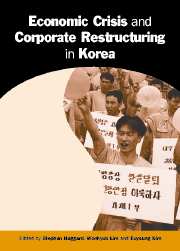Book contents
- Frontmatter
- Contents
- List of Figures
- List of Tables
- Preface and Acknowledgements
- Contributors
- A Note on Usage
- Abbreviations
- 1 Introduction: The Political Economy of Corporate Restructuring
- Part I The Politics and Economics of the Chaebol Problem
- Part II The Political Economy of Crisis Management
- Part III Reform and Restructuring
- 9 The Corporate Bankruptcy System and the Economic Crisis
- 10 Foreign Direct Investment and Corporate Restructuring after the Crisis
- 11 Competition Law and Policy
- 12 Reform of Corporate Governance
- 13 Conclusion: Whither the Chaebol?
- Index
10 - Foreign Direct Investment and Corporate Restructuring after the Crisis
Published online by Cambridge University Press: 05 July 2014
- Frontmatter
- Contents
- List of Figures
- List of Tables
- Preface and Acknowledgements
- Contributors
- A Note on Usage
- Abbreviations
- 1 Introduction: The Political Economy of Corporate Restructuring
- Part I The Politics and Economics of the Chaebol Problem
- Part II The Political Economy of Crisis Management
- Part III Reform and Restructuring
- 9 The Corporate Bankruptcy System and the Economic Crisis
- 10 Foreign Direct Investment and Corporate Restructuring after the Crisis
- 11 Competition Law and Policy
- 12 Reform of Corporate Governance
- 13 Conclusion: Whither the Chaebol?
- Index
Summary
Korea has seen tremendous changes in its foreign economic relations since the outbreak of the currency-cum-financial crisis in 1997. One notable result is a significant increase in foreign direct investment (FDI), following dramatic liberalization measures and active solicitation of foreign investors. Ceilings on foreign equity ownership in the stock market have been eliminated, cross-border mergers and acquisitions are now allowed, and foreign land ownership has been fully liberalized. Indeed, the Korean economy has become more “internationally contestable” than it ever was before.
This chapter focuses on the role of FDI in corporate restructuring and its general impact on the competitive environment. Of course, the effect of FDI takes place over the long term, and it may be too early to evaluate the impact of these policy changes. However, because these changes have been so dramatic and significant, it is worthwhile to explore some of their effects on economic restructuring. This is especially true because many in Korea feel threatened by massive inflows of FDI, and the potentially anti-competitive effects of large multinationals. The first section surveys the literature. The second section examines policy changes regarding FDI and the general pattern of inflows. The third section looks at changing modalities of FDI and the increasing role of subnational governments in attracting it. The fourth section provides some brief case studies.
- Type
- Chapter
- Information
- Economic Crisis and Corporate Restructuring in KoreaReforming the Chaebol, pp. 233 - 264Publisher: Cambridge University PressPrint publication year: 2003
- 2
- Cited by



